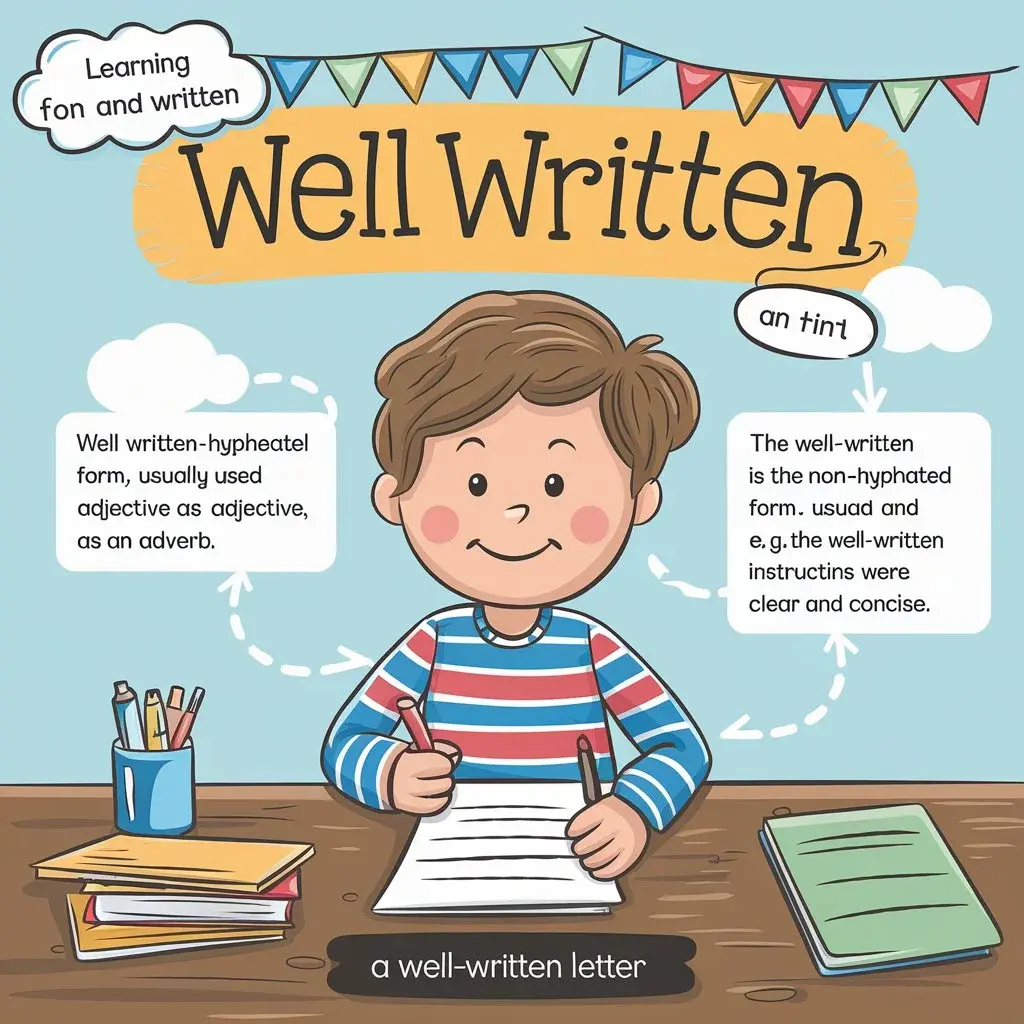“Discover the difference between well written and well-written in our comprehensive guide. Learn when to use each term correctly, explore examples, and enhance your writing skills with our easy-to-follow tips. Perfect for students and professionals alike!”
Hyphenation rules in English can be confusing at first glance, but once you understand them, they become quite straightforward. Hyphenated words are everywhere in English, and understanding the rules will give you more confidence in your writing. So, let’s explore: should it be well written or well-written?
Well Written or Well-Written – Hyphenated or Not?
When deciding whether to use a hyphen in well written, the key is whether there’s a noun or object directly following the phrase.
- Use “well-written” with a hyphen when the phrase modifies a noun or object immediately after it.
- Use “well written” without a hyphen when there’s no noun or object present. In this case, the phrase functions more as an independent description.
Examples of When to Use “Well Written”
While explaining the hyphenation rule helps, examples make it clearer. Here are instances where we use well written without the hyphen. Remember, this occurs when the phrase is not directly modifying a noun or object that comes right after it.
Examples
- This article is well written.
- My résumé is well written.
- That email was really well written.
- My English teacher said my homework was well written.
- I only enjoy books that are well written.
- The report was well written and easy to understand.
- That article is well written and insightful.
- The instructions for the game are well written.
- His essay was so well written that it received full marks.
- I found the novel to be well written, with a captivating plot.
- Her speech was well written, and the audience was moved.
- The manual is well written, making the assembly process simple.
- Your blog post was well written, and it conveyed the message clearly.
- That research paper is extremely well written.
- My professor said my thesis was well written and well-researched.
- The script for the play is well written and full of emotion.
- I think your review was well written and very helpful.
- The conclusion of the book was well written, tying up all loose ends.
- His apology letter was well written, showing genuine remorse.
- The documentary’s narration was well written, giving it depth and clarity.
In each of these sentences, “well written” is not directly modifying a noun but is standing on its own at the end of the clause.
Examples of When to Use “Well-Written”
Now, let’s look at when to hyphenate the phrase. We use well-written when we are modifying a noun or object in the sentence. This becomes more obvious with a few examples:
Examples
- This is a well-written book.
- My boss said I have a well-written CV.
- I’m reading a well-written novel.
- That’s a well-written journal.
- We found a well-written manuscript.
- This is a well-written article on climate change.
- She gave me a well-written letter of recommendation.
- I am reading a well-written mystery novel.
- The well-written speech captivated the audience.
- We discovered a well-written manuscript in the archives.
- The editor praised the well-written proposal.
- It’s a well-written essay with strong arguments.
- His resume is a well-written reflection of his experience.
- The well-written movie script won multiple awards.
- That’s a well-written email, clear and professional.
- The professor handed back a well-written research paper.
- A well-written instruction manual makes all the difference.
- I love reading well-written autobiographies.
- The report was concise and well-written, making it easy to follow.
- The well-written guide helped me navigate the city.
In these cases, the phrase “well-written” is modifying a specific noun like “book,” “CV,” or “manuscript,” so we use a hyphen.
Is “Well Written” Hyphenated in AP Style?
According to the AP Stylebook, hyphens are used to connect two or more closely related words. This helps the reader understand the relationship between the words. In the case of well-written, when modifying a noun, we hyphenate it to form a compound modifier. When well written isn’t used to directly modify a noun, the hyphen is unnecessary.
Examples
- She submitted a well-written essay for the competition.
- This is a well-written article on health and wellness.
- The well-written report helped clarify the project’s goals.
- His well-written book won a literary award.
- The director praised the well-written script for its originality.
- We received a well-written letter of support from the committee.
- The well-written resume caught the hiring manager’s attention.
- Her well-written speech left a lasting impression on the audience.
- That was a well-written manual for troubleshooting the device.
- The journalist produced a well-written article for the newspaper.
- It’s a well-written proposal that outlines the project’s benefits.
- The well-written play moved everyone in the audience.
- I was impressed with his well-written research paper.
- This is a well-written memo that clearly defines the new policy.
- The author’s well-written biography received critical acclaim.
Should I Capitalize “Written” in “Well-Written”?
Hyphenation is tricky enough, but capitalization in titles adds another layer of complexity. There are three main capitalization styles you can choose from, and they each treat hyphenated words differently:
- First-Word Only Capitalized: Only the first word of the hyphenated phrase is capitalized unless it includes a proper noun. In this case, “well-written” would be “Well-written.”
- Sentence Case: The first word is capitalized, and smaller words like prepositions and conjunctions are lowercase. So, in this style, “well-written” would look like “Well-written.”
- Title Case: Every word is capitalized, including both parts of hyphenated words. So, “well-written” becomes “Well-Written.”
Choose your capitalization style based on your overall formatting preference.
Alternatives to “Well-Written”
If you’re struggling with the hyphen rule or just want to avoid it altogether, here are some great alternatives that convey the same meaning as well-written:
- absorbing
- eloquent
- enjoyable
- gripping
- fascinating
These words work well and eliminate any confusion about hyphenation.
Quiz – Well Written or Well-Written?
Let’s see how much you’ve learned about well written vs. well-written! Choose the correct form for each sentence:
- These articles are incredibly (A. well written / B. well-written).
- They say I’m a (A. well written / B. well-written) author.
- You send (A. well written / B. well-written) emails.
- My boss says he’s (A. well written / B. well-written).
- That’s a (A. well written / B. well-written) sign.
Quiz Answers:
- A – well written
- B – well-written
- B – well-written
- A – well written
- B – well-written
FAQs
When do I use “well-written” with a hyphen?
Use “well-written” with a hyphen when it modifies a noun directly after it. For example, “This is a well-written book.” The hyphen combines the words to function as a compound adjective. It helps clarify that the two words describe the noun together.
When do I use “well written” without a hyphen?
Use “well written” without a hyphen when it stands alone or isn’t followed by a noun. For example, “Her essay is well written.” Here, it’s not modifying a noun directly but rather serves as a description by itself. No hyphen is needed in such cases.
Is “well-written” hyphenated in AP Style?
Yes, in AP Style, “well-written” is hyphenated when it’s used as a compound modifier before a noun. This is because the hyphen links the words to describe the noun. When the phrase comes after the noun or stands alone, no hyphen is used. AP Style aims to improve clarity.
What’s the difference between “well written” and “well-written”?
The difference is in the hyphen. “Well-written” is hyphenated when it modifies a noun directly, such as in “a well-written report.” “Well written” without the hyphen is used when the phrase stands alone, like “The report was well written.” Understanding the sentence structure helps choose the right form.
Do I always need to hyphenate “well-written”?
No, only hyphenate “well-written” when it comes directly before a noun. If it’s used on its own or follows the noun, use “well written” without the hyphen. For instance, “She wrote a well-written letter” versus “The letter was well written.” The hyphen is only needed when forming a compound modifier.
Should “written” be capitalized in “well-written”?
In most cases, only “well” is capitalized, not “written”, depending on the capitalization style. If you’re using title case, both words might be capitalized as in “Well-Written.” In sentence case, only “well” is capitalized unless it’s the first word of a title. Different styles treat hyphenated words differently.
Are there alternatives to saying “well-written”?
Yes, you can use synonyms like “eloquent”, “gripping”, “clear”, or “engaging”. These words eliminate the need for a hyphen and convey a similar meaning. They describe the quality of writing without relying on the phrase “well-written.” This way, you avoid any confusion over hyphenation.
Final words
In conclusion, understanding when to use “well-written” versus “well written” comes down to identifying if there is a noun immediately following the phrase. If it directly modifies a noun, use the hyphen to form a compound adjective. However, when the phrase stands on its own, leave it unhyphenated. Mastering this rule will help you write more clearly and professionally. In AP Style, the same guidelines apply to ensure clarity in writing. By keeping these simple rules in mind, you’ll have no trouble deciding when to hyphenate or not.

I’m Clara Whitmore, the girl running the show at “Grammer Grove.” I’ve been playing with expressions and formats to make grammer a whole lot of fun. Over at Grammer grove, we’re here to make your English grammer incredible. Let’s add some professionalism and gratitude to yourwritting together!












